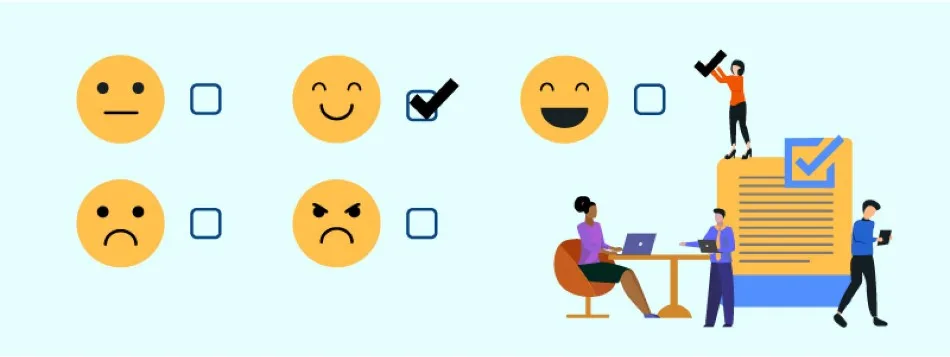REVE Chat Version 4.0
Version 4.0
Upgrade your website to an IM platform & beyond
Blending the strengths of IM and Live Chat
Upgrade your website to an instant messaging platform and beyond


Words are incredibly powerful for handling clients’ conversations as businesses often can truly either make or break customer service experiences. Using the right empathy statements and phrases for customer service makes all the difference between a poor or delightful experience.
According to the Empathy Index, “Empathy is more important to a successful business than it has ever been, correlating to growth, productivity, and earnings per employee.”
Businesses can’t provide 100% effective solutions all the time. But what they provide is the best empathetic words in all the points of interaction to deliver a positive experience.
Beyond feeling good for your customer and boosting key business metrics, the importance of empathy statements in customer service can be good morale-boosting for your team.
Simply put, an empathy statement is defined as the act of understanding your customer’s experience in a way that you are sensitive to your customer’s thoughts and feelings.
Empathy statements for customer service show your ability to “walk a mile in someone else’s shoes”. Using the right phrases from the empathy word list can help so much in making customers feel that they are understood, and respected, and their feelings are validated.
Here are the importance of empathy statements in customer service and acting with compassion.
Ryanair’s empathy success story after implementing their “Always Getting Better” program. It helped to sort out many customer annoyances like hidden charges, unallocated seating, and carry-on baggage restrictions. Ryanair saw a net profit increase from €867 million to €1.24 billion (US$1.39 billion).
CEO Michael O’Leary famously remarked, “If I’d only known that being nice to customers was going to work so well, I’d have started many years ago.”
REVE Chat is a perfect fit here that helps you to be nice to your customers by understanding their needs or pain points and aligning service accordingly that fulfills their expectations.
It’s the right time to sign up for REVE Chat and explore how you can deliver a delightful experience to your customers.
It is a crucial skill in customer service as it helps build rapport, trust, and satisfaction. Here’s an in-depth exploration of how to empathize with a customer:
This involves not just hearing words but understanding the underlying message. It’s about giving your full attention to the customer, which means eliminating distractions and truly focusing on what they are saying. Whether the interaction is in person, over the phone, or via chat, active listening is the foundation of effective communication in customer service. You should always maintain eye contact, nodding, and providing verbal cues like “I see” or “Go on” can signal to the customer that you are fully engaged.
These are tools that ensure mutual understanding. You can repeat back the customer’s concerns in your own words to confirm that you’ve correctly understood their situation but also convey to the customer that their perspective is valued. It’s a way of saying, “I hear you, and I want to make sure I’ve got it right.” This practice helps to avoid misunderstandings and clarifies any ambiguity in the customer’s communication.
It’s about acknowledging their emotions and demonstrating that you care. Phrases like “I understand how frustrating that must be” or “I’m sorry to hear that you’re going through this” express empathy. This acknowledgment helps build a connection with the customer, making them feel heard and valued.
This requires imagining the impact of the situation on the customer’s life and emotions. Even if you haven’t experienced the same issue, recognizing the customer’s perspective and validating their feelings contributes to a more empathetic response. It shows that you acknowledge the validity of their emotions and concerns.
A genuine smile, maintaining eye contact, and an open posture convey warmth and interest. Avoiding defensive postures or gestures that might signal disinterest is equally important. Positive body language enhances the customer’s perception of your sincerity and commitment to assisting them.
If a customer expresses frustration or disappointment, acknowledging those emotions directly is crucial. Reflect on the specifics of what the customer has shared and respond in a way that aligns with their emotional state. This not only shows understanding but also helps in building trust and rapport.
It’s about reassuring the customer that you are there to help and actively working towards a solution. Clearly communicate your commitment to resolving their issue and outline any steps that will be taken. You can deliver actionable solutions or a roadmap to give the customer confidence that their concerns are being taken seriously.
After the initial interaction, reaching out to ensure the resolution has been satisfactory reinforces the idea that the customer’s satisfaction matters beyond the immediate issue. This step not only provides an opportunity to address any lingering concerns but also contributes to building a lasting relationship based on trust and reliability.
Expressing empathy is a good, natural, and honest way to promote relationships, both personally and professionally. The importance of empathy statements for customer service has a direct impact on creating a connection during a customer conversation. It requires your complete attention to the conversation and you are ready to take responsibility for them.
Your customer support team should be naturally empathetic, or they should be. That being said, nobody can be perfect all the time. We have compiled a few lists of empathetic statements and phrases to help inspire your team to craft even more empathetic responses across different scenarios. So, let’s explore 30 empathy statements for customer service with great examples that create a long-lasting impression.
Possibly, the best thing you can do is to acknowledge how your customer feels. When you try to connect with their pain or struggles, it makes them feel supported. It shows that you are genuinely putting effort into understanding their feelings.
When customers are frustrated, they just want to be heard attentively. They want validation that what they are going through is really very difficult.
Here are some empathy statement samples that can be used to acknowledge or validate consumer pain points.
Saying sorry when your customers are upset is a great way to start mending the relationship, and shows that you understand that they have been made to feel negative about your business.
By feeling sorry for what they have gone through, you create a sense of accord. It just not shows empathy for the unfortunate situation, but also assures them that their feelings are understandable.
Using these empathy words shows that you are personally involved in the conversation. This personal approach demonstrates a willingness to identify with the customer’s problems and build a trustworthy relationship.
Customers feel comfortable when they find you genuinely listening to their problems and appreciate your customer service etiquette.
You can’t empathize with customers unless you understand their pains. Outstanding support is defined by genuine empathy and it is crucial to convey to your customers. Listen to them carefully to read their emotions and relate how they feel.
It shows your customer’s side.
Going through difficulties can be a terrible experience for anybody. That is the reason why people share their struggles as if they are longing for a connection. They want someone to show interest in their story and understand how they are feeling.
The best way to connect with someone is not by talking, but by listening. Show you care by asking questions and showing a genuine interest in what they have to say.
Some examples of empathy statements to align conversations with customers:
There are certain situations or incidents that we can relate to when we hear from customers. By using this empathy statement sample, you can support your customers and make them feel that they have been really going through a tough time.
When you align your statements along with your customers they open up explaining in detail. It helps you to understand your customer’s situation better and serve them better.
Not always you can provide a feasible solution to your customers but every time you can comfort them with your empathetic words. Listening to them patiently to what they have gone through is enough.
When you show that you are equally sad by listening to what customers have experienced with your product or service, they feel that you are validating their problem and will be able to get a feasible solution.
When customers reach out to you they look for concrete information or effective solutions. The customer service agents should have a full understanding to make the process of what happens next, clear to the customer. Do you want to learn more about customer service to show empathy to a customer in a better way? Find free customer service resources.
Reassuring the customers that the company will be striving to fix their issues creates a good impression and further builds brand rapport.
Here is the empathy statement sample below to show how to reassure customers.
When you appreciate your customers for reporting about any product issue or complaining about any service, and assure them to act on it positively, it makes them feel happy that there will be no future hassle.
Giving credence to your customer complaints and valuing their feedback encourages them to reach you when they face any problem.
Reaffirming to customers that you will provide a quick and effective resolution helps to strengthen the rapport between you and customers. When you use such statements, customers set expectations that you are putting effort into fixing the issue faster.
Using ‘we’ gives an idea to the customers that it is the effort of the whole team and their issue is set as a priority.
Saying customers what they are saying is absolutely correct shows respect and empathy for their opinions. It also displays that you are considering your customer’s predicament.
Generally, customers don’t share their opinions as it is not valued or given an empathetic response.
When someone chooses to open up to you, it shows they really trust you. It’s your job to honor that and respond with care. Offer gratitude to them for sharing their experience in terms of good or bad feedback will always benefit your company.
Let your customers know that you appreciate their sharing with you and acknowledge that it will be implemented. When you do this, it signals that you are a safe harbor for vulnerability.
Here are positive empathy statements for call centers that can help you to deliver a pleasing response.
Generally, customers do not prefer giving feedback due to many reasons. Customer feedback is the best way to improve your overall brand. When they provide their honest feedback, thanking them gives a very good impression.
When you use statements full of gratitude, it expresses that you are genuinely thankful for the feedback they provided.
Companies that welcome customer feedback grow by increasing their loyal customer base. Feedback if looked into carefully brings golden opportunities for every business.
Expressing gratitude to the customers should be practiced whenever they reach out with complaints, feedback, or ideas.
Feedback covers the overall customer experience with your products or services. When you ask customers for feedback, it involves their time to provide it.
Always appreciate and thank them for spending time to share their feedback with you.
It is very important to be encouraging and motivating when your customers are going through a tough time.
Where one side shows customers to fix the issue or look at the brighter side; rarely helps although intentions are good, the other side is that you can’t be encouraging. You simply have to be mindful of how you approach it.
Instead of saying, “It will get better” or “Here’s what I would do,” remind customers that they are important to your business and you always value them.
Here are some good examples of empathy statements and phrases.
Listening to the entire story and concluding that the customer is a strong person sounds encouraging. It makes the customer feel that you really admire the way he handled the situation.
Besides, using good empathetic words helps you to maintain your brand credibility.
Businesses can not replace the pain of the tough times customers have gone through, but certainly, they can empathize with them. Customer service agents must practice active listening to understand the entire customer journey.
Using empathetic words surely motivates them and you are there to help them in every possible way. Here are 15 acknowledgment statements in customer service that can be used to improve overall customer experience.
When we say such empathy phrases to customers, it shows we find them strong enough to handle the tough times. It makes them feel you are supportive of them and are ready to help them in every way you can.
When it comes to calming irate customers, skillful use of empathy word lists by your agents is very important. By using good emphatic statements, you can tackle difficult or angry customers.
Here are the best empathy statements for customer service to be followed to calm down irate customers.
Handling angry customers can be frustrating for call center agents still, they should be taken as seriously as possible, and formally empathetic language should be used at all times.
These positive empathy statement samples should be repeated at various points throughout the customer service conversations. It helps to diffuse the anger and reach out to the solution faster.
When customer service agents encounter a furious customer, the first thing is to offer some words of empathetic reassurance. It helps in reducing their anger significantly. Saying thank you for being patient can also diffuse the situation a bit.
It is important to remember that, regardless of how unpleasant he or she might be as a person, each and every one of your customers is an essential source of revenue for your business.
When it comes to handling stressful situations, properly using words and phrases can go a long way in creating a positive service experience.
One of the key aspects of customer service is following up with customers. When you make follow-ups, it helps to comfort them with the knowledge that their issue is being treated. The customers are updated about the process and they stay positive about the whole circumstance.
Here are some examples of positive acknowledgment statements for a call center that show that you commit to and follow up with customers.
When you commit to customers, make sure that you keep your word as it helps to establish trust between the company and the customer.
Keeping the promise helps in building long-standing relationships.
When you acknowledge your customer’s personal holidays, it allows you to add a personal touch to your interaction.
Basing your services across your customer’s schedule demonstrates an empathetic approach.
Encouraging future contact with your customers helps show your company’s commitment to strengthening your customer relationship and fostering advancement in the rapport between the customers and agents.
Providing a sense of immediacy with proper phrases is as important as customer inquiry for businesses. These positive acknowledgment statements are more important for irate customers. Agents can use the right words and reduce customer anger.
Here are the best empathy statements for irate customers that show a caring approach.
At times customers identify some issues that businesses have overlooked. When customers reach out to you, highlighting such issues, you should assure them that the issue they have raised is right.
Using empathy phrases that appreciate them will allow the customers to believe that all their efforts are valued by your company.
Conveying the advisor’s experience in handling calls of this nature provides the customer with a strong indication of the ability of the call center professional to find a swift solution to the query.
When you use such a positive empathy statement for customer service, it shows that you are taking control of the situation, which allows the customer to feel as if the problem has been handed over to the agents.
It also shows that you are personalizing the matter and making the customer feel special.
Certain issues can not be resolved in a day. When customer service agents provide a relevant timeframe for query resolution, the agent must make customers feel relaxed.
When you provide an estimated time for resolution, the customers are in a positive mindset of getting the feasible solution after a day or two.
There are times when customers are not convinced by the answers you give them. Starting an empathetic conversation is the key to handling such situations and building strong customer relations.
But how do you empathize with a customer in such a scenario?
Here are examples of empathy statements for customer service that will help to quell such issues and rebuild customer trust in your service and business processes.
When you exhibit that you value customer feedback and take proactive actions to imply it, customers tend to share honest feedback that turns out to be golden opportunities for your business.
Describing the process of sharing feedback across the right team and departments shows your well-defined process for handling customer concerns.
One of the best ways to use a positive empathy statement is by sharing their own experiences with the customers. Sharing such things with customers signals that it is not only he but many who have faced such an issue.
The customers feel comforted that they will be getting a solution soon.
While closing the conversation, support agents must maintain a respectful tone and empathetic attitude so that customers feel comfortable voicing more concerns and stay satisfied with the service they have received.
Here is an empathy statement sample that can be used while signing off with a customer and staying empathetic.
When you use phrases and rely on customer service script sample to assist your customer concerns further it shows there is no time limit in the job description of your agents and your business has no limitations on providing great customer service.
Conveying customers about your business objectives and showing that you are always on your heels to support them helps to conclude with a sustained empathetic approach.
Using the right words from the empathy word list such as our customer satisfaction as the prime goal summarizes the collaborative culture, which is the foundation of empathy.
From all the available options, your customers have chosen you for some reason. Let them know, you truly appreciate their choice to work with your business.
Expressing your pleasure in terms of interacting with customers, serving them, and wishing them a good day makes customers delighted and they will be comfortable in reaching out in the future.
Most of the customers’ decisions are largely emotional rather than logical. That’s what makes empathy a great tool to help show customers that you are on their side.
With the right use of empathy statements for customer service, your clients will feel a strong bond with you and your company. And that’s how there is an increase in customer lifetime value (CLTV) and loyalty towards your business.
Believe it or not, you can not always provide the right solution at the right time, but you can always deliver a human connection. The empathy phrases suggested above can handle customers effectively across various situations.
REVE Chat, the omnichannel customer engagement platform provides you advanced tools along with chatbots to enhance your customer communication by understanding their pain points. Sign up with REVE Chat and explore how you can deliver a better customer service experience.
Start a 14-day free trial, no credit card required
Stay updated with the latest trends and ideas we share
What happens when your business doesn’t have a well-defined lead management process in place? You might then struggle to track,...
In your business, you need information about your customers’ pain points, preferences, requirements, and most importantly their feedback. Now think this...
How does the future look like to you with Artificial Intelligence shaping most of our day-to-day tasks? Sometimes it feels...



